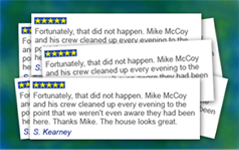Five Deadly Customer Review Mistakes
Five Deadly Customer Review Mistakes

There are enormous benefits to having genuine 5-star customer reviews on the Internet.
They include:
Higher position on search engines and review websites
A higher level of trust when customers see and read your reviews
Your business listing stands out among your competitors’
Star-enhanced ads on Google Adwords
More calls and visits from Internet searchers
Because of this, a handful of business owners and unethical marketing companies are finding ways to cheat the system. This is a HUGE mistake. The consequences of scamming the system and getting caught can devastate a business.
All of the search engines and review websites have policies concerning customer reviews and so does the Federal Trade Commission. You don’t want to upset any of them, especially Google and the FTC.
Consequences of Breaking The Rules
![]() Having customer reviews removed from your business listing
Having customer reviews removed from your business listing
![]() Having your business listing plummet to the bottom of the results page
Having your business listing plummet to the bottom of the results page
![]() Having your business listing removed from the search engines and review websites
Having your business listing removed from the search engines and review websites
![]() Legal action against your company if you attract the attention of the FTC
Legal action against your company if you attract the attention of the FTC
If you’re going to generate positive customer reviews on the Internet, there’s only one way to do it. Real customers must write real reviews from their personal accounts, without being compensated for doing so. If they don’t have an account with a search engine or review website, they must get one before they can leave their reviews. Period.
Anything else is considered either fraudulent or review spam– both of which will attract the attention of the search engines, review websites and the Federal Trade Commission.
If you want 5-star customer reviews on the Internet, acquire them properly.
Provide service worthy of 5-stars and make it as easy as possible for your customers to write a review for your business.
Don’t break or bend the rules when the consequences WILL be devastating.
Unfortunately, unethical review services are willing to take risks with your business that you would never allow if you knew the consequences. They’ll give you dozens of plausible reasons to persuade you that what they’re doing is OK, but in the end, it’s your business that’s going to suffer the consequences– not theirs.
Here’s What You Need To Know To Protect Yourself
1. No Fake News
 Cornell University in Ithaca, NY created an algorithm in 2011 that can detect fake reviews. You can download their findings in a PDF entitled: “Deceptive Opinion Spam By Any Stretch of the Imagination.”
Cornell University in Ithaca, NY created an algorithm in 2011 that can detect fake reviews. You can download their findings in a PDF entitled: “Deceptive Opinion Spam By Any Stretch of the Imagination.”
Today’s technology can detect fake reviews with a 90% accuracy rate. How long do you think it will be before Google, Yahoo!, Tripadvisor, Citysearch, Insiderpages and hundreds of other review sites incorporate this software into their algorithms … if they haven’t already?
Don’t write or ask someone else to write a fake review for your business. Even though a well written fake review can be difficult for humans to identify, it’s easy for software to detect. Don’t take that risk! The search engines and review websites don’t allow fake reviews on their websites and you shouldn’t either. Who wants a fake review associated with their business anyway? It’s just bad form.
2. No Fake Accounts
 Search engines and review websites don’t want you or anyone else to copy customer comments from emails or testimonial letters onto their websites using fake accounts (accounts that were not created by the reviewers). The reviewer is the only person authorized to create an account and leave a review on these sites. If you take a customer review and upload it to one of these sites using a fake account, it’s fraudulent. It’s not the kind of activity you want to get involved in.
Search engines and review websites don’t want you or anyone else to copy customer comments from emails or testimonial letters onto their websites using fake accounts (accounts that were not created by the reviewers). The reviewer is the only person authorized to create an account and leave a review on these sites. If you take a customer review and upload it to one of these sites using a fake account, it’s fraudulent. It’s not the kind of activity you want to get involved in.
Don’t let anyone gather reviews on your behalf (even if those reviews are real reviews from happy customers) and upload them through an account that was not created by the person who wrote the review. Follow the rules!
3. Don’t Ask Customers To Write Reviews From The Same Computer Or Location
 Search engines and review websites do not want multiple reviews uploaded to their website from the same computer or IP address. Many business owners, without knowing any better, ask their customers to review their business from their place of business.
Search engines and review websites do not want multiple reviews uploaded to their website from the same computer or IP address. Many business owners, without knowing any better, ask their customers to review their business from their place of business.
Search engines mistake reviews being uploaded from a single computer or IP address as SPAM. It’s not normal for multiple customer reviews to come from a single computer or location.
The problem your customers may have, is that you’re asking them to sign-in to their personal accounts on a computer that they have no control over. Would you leave your username and password on a computer without knowing how secure it is? If a customer’s username or password is ever compromised, you may well get the blame.
Perhaps what is most important, is what customers think when the person who asks them to write a review, doesn’t let them leave the office until they’ve completed it. Do you think they’ll be more likely or less likely to recommend the business to their family and friends and potentially subject them to the same situation? Personally, I wouldn’t want any positive review on the Internet, that caused a customer to end up feeling intimidated or resentful. Do you?
Some individuals will tell you that they manage a host of people working from multiple locations, who create accounts and upload reviews. There are two problems with this process. First, sites like Google can easily detect these schemes. And secondly, creating fake accounts from any computer is fraudulent.
4. No Duplicate Reviews
 All of the search engines and most of the review websites don’t accept reviews that can be found anywhere else on the Internet. This includes reviews displayed on your own website. If Google notices a review on their website and detects the same or similar review on any other website, they’ll remove it from your business listing. Here’s what Google has to say about the issue of duplicate or similar reviews.
All of the search engines and most of the review websites don’t accept reviews that can be found anywhere else on the Internet. This includes reviews displayed on your own website. If Google notices a review on their website and detects the same or similar review on any other website, they’ll remove it from your business listing. Here’s what Google has to say about the issue of duplicate or similar reviews.
This may not be a huge problem if you have 50 reviews on Google and one or two of those reviews are similar. (You’ll find a handful of customers who are so happy with your service that they’ll post their reviews on multiple websites.) The problem arises when all 50 reviews on Google are also on other websites. Imagine having all of your hard earned 5-star customer reviews removed because someone decided it would be a good idea to share those reviews on other websites. You’ll never get those reviews back.
There are exceptions. If a customer writes a review or testimonial and sends it directly to you, you can share it on your social networking sites. That includes Facebook, Google Plus, Twitter and LinkedIn. You can also share the review in your emails, on your website or blog, in print or anywhere else that does not require the author of the review to have an account with the site before it can be posted.
5. No Rewards For Reviews
 The search engines, review websites and the Federal Trade Commission discourage businesses from offering rewards like discounts, upgrades or special treatment in exchange for reviews, unless the reader of the review is informed that the person endorsing the product or service was paid in return for their review. If you’ve been offering your customers any form of compensation for writing reviews, please stop. It’s against the law.
The search engines, review websites and the Federal Trade Commission discourage businesses from offering rewards like discounts, upgrades or special treatment in exchange for reviews, unless the reader of the review is informed that the person endorsing the product or service was paid in return for their review. If you’ve been offering your customers any form of compensation for writing reviews, please stop. It’s against the law.
You can provide your customers with coupons, perks and other wonderful things as long as you don’t do it in exchange for a review. Read the FTC’s position on this. You can also reward your staff for asking customers to write reviews, as long as they don’t reward their customers for writing them.
Conclusion
Being an informed business owner is the first step to avoiding disaster when it comes to customer reviews on the Internet. If you try to game the system, the system is going to game you back. If you follow the rules, you’ll be greatly rewarded.
The only way to get genuine 5-star customer reviews on the Internet, and more importantly, referrals from your happy customers, is to provide exceptional service and make it easy for customers to leave a review and recommend you to their friends.
This blog is not intended to interpret FTC regulations. We are relatively sure that is not actually possible to do so. If you have a question about the legality of something that you’re doing, check with a lawyer.

Cornell University in Ithaca, NY created an algorithm in 2011 that can detect fake reviews. You can download their findings in a PDF entitled: “Deceptive Opinion Spam By Any Stretch of the Imagination.”
Today’s technology can detect fake reviews with a 90% accuracy rate. How long do you think it will be before Google, Yahoo!, Tripadvisor, Citysearch, Insiderpages and hundreds of other review sites incorporate this software into their algorithms … if they haven’t already?
Don’t write or ask someone else to write a fake review for your business. Even though a well written fake review can be difficult for humans to identify, it’s easy for software to detect. Don’t take that risk! The search engines and review websites don’t allow fake reviews on their websites and you shouldn’t either. Who wants a fake review associated with their business anyway? It’s just bad form.

2. No Fake Accounts
Search engines and review websites don’t want you or anyone else to copy customer comments from emails or testimonial letters onto their websites using fake accounts (accounts that were not created by the reviewers). The reviewer is the only person authorized to create an account and leave a review on these sites. If you take a customer review and upload it to one of these sites using a fake account, it’s fraudulent. It’s not the kind of activity you want to get involved in.
Don’t let anyone gather reviews on your behalf (even if those reviews are real reviews from happy customers) and upload them through an account that was not created by the person who wrote the review. Follow the rules!

3. Don’t Ask Customers To Write Reviews From The Same Computer Or Location
Search engines and review websites do not want multiple reviews uploaded to their website from the same computer or IP address. Many business owners, without knowing any better, ask their customers to review their business from their place of business.
Search engines mistake reviews being uploaded from a single computer or IP address as SPAM. It’s not normal for multiple customer reviews to come from a single computer or location.
The problem your customers may have, is that you’re asking them to sign-in to their personal accounts on a computer that they have no control over. Would you leave your username and password on a computer without knowing how secure it is? If a customer’s username or password is ever compromised, you may well get the blame.
Perhaps what is most important, is what customers think when the person who asks them to write a review, doesn’t let them leave the office until they’ve completed it. Do you think they’ll be more likely or less likely to recommend the business to their family and friends and potentially subject them to the same situation? Personally, I wouldn’t want any positive review on the Internet, that caused a customer to end up feeling intimidated or resentful. Do you?
Some individuals will tell you that they manage a host of people working from multiple locations, who create accounts and upload reviews. There are two problems with this process. First, sites like Google can easily detect these schemes. And secondly, creating fake accounts from any computer is fraudulent.

4. No Duplicate Reviews
All of the search engines and most of the review websites don’t accept reviews that can be found anywhere else on the Internet. This includes reviews displayed on your own website. If Google notices a review on their website and detects the same or similar review on any other website, they’ll remove it from your business listing. Here’s what Google has to say about the issue of duplicate or similar reviews.
This may not be a huge problem if you have 50 reviews on Google and one or two of those reviews are similar. (You’ll find a handful of customers who are so happy with your service that they’ll post their reviews on multiple websites.) The problem arises when all 50 reviews on Google are also on other websites. Imagine having all of your hard earned 5-star customer reviews removed because someone decided it would be a good idea to share those reviews on other websites. You’ll never get those reviews back.
There are exceptions. If a customer writes a review or testimonial and sends it directly to you, you can share it on your social networking sites. That includes Facebook, Google Plus, Twitter and LinkedIn. You can also share the review in your emails, on your website or blog, in print or anywhere else that does not require the author of the review to have an account with the site before it can be posted.

5. No Rewards For Reviews
The search engines, review websites and the Federal Trade Commission discourage businesses from offering rewards like discounts, upgrades or special treatment in exchange for reviews, unless the reader of the review is informed that the person endorsing the product or service was paid in return for their review. If you’ve been offering your customers any form of compensation for writing reviews, please stop. It’s against the law.
You can provide your customers with coupons, perks and other wonderful things as long as you don’t do it in exchange for a review. Read the FTC’s position on this. You can also reward your staff for asking customers to write reviews, as long as they don’t reward their customers for writing them.
Conclusion
Being an informed business owner is the first step to avoiding disaster when it comes to customer reviews on the Internet. If you try to game the system, the system is going to game you back. If you follow the rules, you’ll be greatly rewarded.
The only way to get genuine 5-star customer reviews on the Internet, and more importantly, referrals from your happy customers, is to provide exceptional service and make it easy for customers to leave a review and recommend you to their friends.
This blog is not intended to interpret FTC regulations. We are relatively sure that is not actually possible to do so. If you have a question about the legality of something that you’re doing, check with a lawyer.
